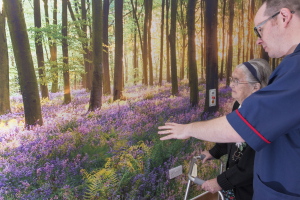Patients at Oxford City’s community hospital are to enjoy an enhanced environment and better access to treatments, as the facility moves to a new home on the site of the Churchill hospital.
The newly refurbished unit run by Oxford Health NHS Foundation Trust was previously located on the seventh floor of the John Radcliffe hospital but is now based at the Fulbrook Centre on the grounds of the Churchill hospital, following a move last weekend. Patients are now able to enjoy the privacy of a single bedroom with views of a garden backing onto a golf course, as well as easier access to specialist therapy services.
Artwork throughout the unit has been specially commissioned to enhance the wellbeing of patients, who are largely elderly and referred to the hospital for rehabilitation or end-of-life care. The facility has been designed and decorated in line with the principles of ‘Dignity Plus’, as part of a Department of Health national project to deliver improvements in caring and healing environments for people living with dementia in Oxfordshire.
The new City hospital is also located next to specialist older adult mental health teams operating from the Fulbrook centre. This will increase the opportunities for older people’s mental and physical health teams to share expertise and resources.
Karen Campbell, Head of Community Hospitals for Oxford Health NHS Foundation Trust, said: “We are excited to be moving our City hospital into this new environment, which will offer many benefits for patients. Not only are the surroundings more pleasant, and more likely to help people on the way to recovery, but the co-location of these services with older adult mental health services means that we will be able to exchange knowledge that will benefit patients under the care of both teams.”
Published: 27 November 2014

